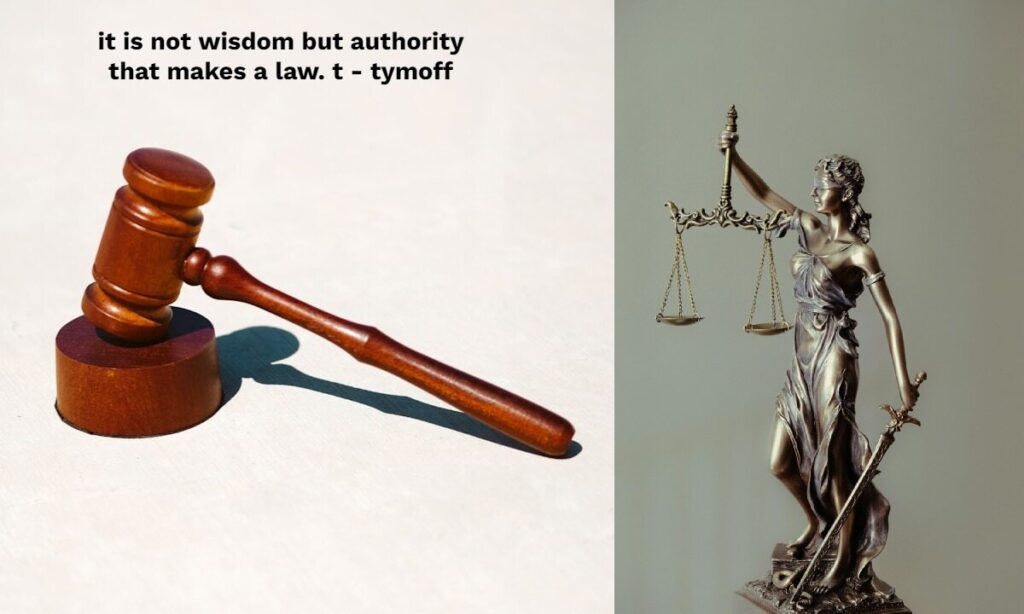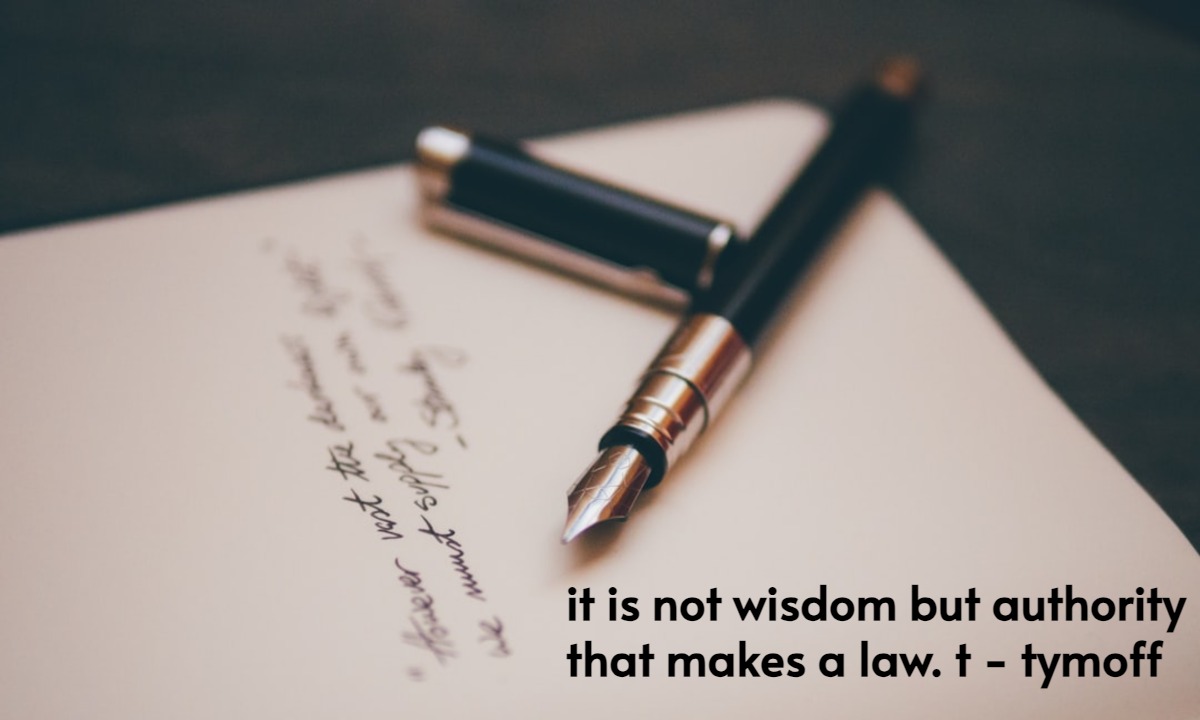The phrase it is not wisdom but authority that makes a law. t – tymoff encapsulates a profound reality about the nature of legal structures. While we’d desire that legal guidelines are made from an area of information and moral clarity, the truth is often more complicated. Legal guidelines are in the long run enforced by using the authority of these in strength, not always by means of the sagacity in their judgments. This weblog explores the results of this assertion, inspecting historic, philosophical, and present day perspectives on the connection among authority and regulation.
The Foundation Of Law Authority Over Wisdom
At its center, the statement it is not wisdom but authority that makes a law. t – tymoff shows that the legitimacy of laws stems from the energy systems that implement them rather than their intrinsic information or justice. This attitude may be traced again to numerous philosophical traditions and historical contexts.
Historical Context
Traditionally, laws have frequently been units of energy. Historical prison codes, which include Hammurabi’s Code, had been promulgated through rulers who asserted their divine proper or navy may to manipulate. These laws were less about ethical expertise and more about maintaining order and management. In addition, in feudal societies, legal guidelines served the hobbies of the ruling magnificence, making sure their dominance and the subjugation of the serfs and peasantry.
Philosophical Insights
Philosophers like Thomas Hobbes and Max Weber have additionally commented on the nature of authority and regulation. Hobbes, in his seminal work “Leviathan,” argued that inside the state of nature, lifestyles would be “solitary, poor, nasty, brutish, and brief.” To break out of this chaos, people consent to be ruled, surrendering some of their freedoms to a sovereign authority in exchange for safety and order. This social agreement is less about knowledge and more about pragmatic necessity.
Max Weber, however, distinguished between special kinds of authority: traditional, charismatic, and criminal-rational. Criminal-rational authority, which underpins contemporary criminal structures, is based totally on a set of guidelines and tactics which can be familiar as legitimate. This sort of authority does not always depend on the information of the legal guidelines but on the attractiveness of the device that creates and enforces them.
The Role Of Authority In Modern Legal Systems
In current societies, the interplay among authority and awareness in law-making continues to be obtrusive. Democratic structures ideally balance authority with collective know-how thru mechanisms like representative government, public consultations, and judicial review. But, real exercise is frequently famous as an extra complex reality.
Legislative Processes
In democratic international locations, laws are typically made by means of elected representatives. While these individuals are purported to act within the public hobby and convey a degree of knowledge to their legislative duties, they have an impact on political parties, lobbying companies, and the want to secure re-election can skew their choices. For that reason, the authority to make legal guidelines lies with individuals who keep political electricity, which might not continually align with smart or simply consequences.
Judicial Interpretation
Judges play an important function in decoding laws. Their authority is derived from their function within the judiciary, yet their rulings can notably shape the application of laws. Even as judicial decisions are preferably primarily based on felony concepts and precedents, personal interpretations and societal influences can affect judgments. Right here, too, authority plays a decisive function, every so often overshadowing natural understanding.
Enforcement Agencies
Regulation enforcement groups and regulatory bodies make certain that legal guidelines are upheld. The authority vested in those establishments presents them the power to behave, often with large discretion. Their actions and priorities can substantially impact how legal guidelines are perceived and experienced with the aid of the general public, reinforcing the idea that authority, in place of knowledge, is the driving pressure in the back of legal structures.

Case Studies Authority Versus Wisdom In Law
As an additional approach to highlight the idea that it is not wisdom but authority that makes a law. t – tymoff Let’s recall a few case studies in which power has clearly defeated knowledge in the creation and application of regulations.
The War On Drugs
The warfare on pills, initiated in the USA within the Seventies, is a stark instance of ways authority can power regulation-making in approaches that can lack expertise. The aggressive criminal framework installed to combat drug use and trafficking has caused mass incarceration, disproportionately affecting minority communities. Critics argue that those laws have finished extra harm than precise, suggesting that a greater nuanced, information-primarily based technique that specialize in public health in place of criminalisation would have been extra effective.
Internet Regulation
In the realm of technology, the fast tempo of innovation regularly outstrips the capacity of legislators to reply wisely. Laws regulating the net and virtual privateness are frequently reactionary and encouraged through the lobbying power of major tech businesses. The authority to legislate on this domain does not constantly reflect a deep knowledge of the generation or its societal impacts, mainly due to legal guidelines that can be outdated or ineffective.
Striving For Wisdom In Law-Making
Even as the assertion that it is not wisdom but authority that makes a law. t – tymoff holds a large truth, it additionally serves as a call to action. Recognising this dynamic should inspire us to strive for a prison machine where wisdom performs an extra prominent function. Right here are a few ways this can be done:
Participatory Democracy
Attractive residents within the legislative manner can assist inject more know-how into law-making. Public consultations, referendums, and participatory budgeting are some mechanisms that can bridge the gap between authority and wisdom.
Evidence-Based Policy
Regulation-makers have to rely upon empirical statistics and clinical research whilst crafting laws. Proof-primarily based policy-making can assist ensure that legal guidelines are not handiest authoritative however also powerful and simple.
Judicial Independence
Preserving an impartial judiciary is critical for balancing authority with wisdom. Judges have to be unfastened from political pressures and capable of interpreting laws based on criminal concepts and the wider public desirable.
Education And Awareness
Selling felony literacy among the populace can empower people to recommend for wiser legal guidelines. An informed citizenry is geared up to keep authorities accountable and push for laws that mirror collective expertise.
Conclusion Balancing Authority And Wisdom
The assertion it is not wisdom but authority that makes a law. t – tymoff highlights an essential issue of criminal structures that can not be left out. Whilst authority is essential to set up and put in force legal guidelines, striving for awareness in law-making is crucial for creating a just and equitable society. Through recognising the inherent anxiety between authority and awareness, we can paint a felony framework that better serves the common right, combining the strength to enforce with the insight to achieve this justly.
In conclusion, acknowledging the position of authority in regulation-making does now not imply leaving behind the pursuit of know-how. As a substitute, it needs to encourage efforts to infuse our felony systems with greater knowledge, empathy, and proof-based total tactics, making sure that laws no longer best the ones in power however all members of society.
Also, Read More :- Learn To Sit Back And Observe. Not Everything Need – Tymoff
